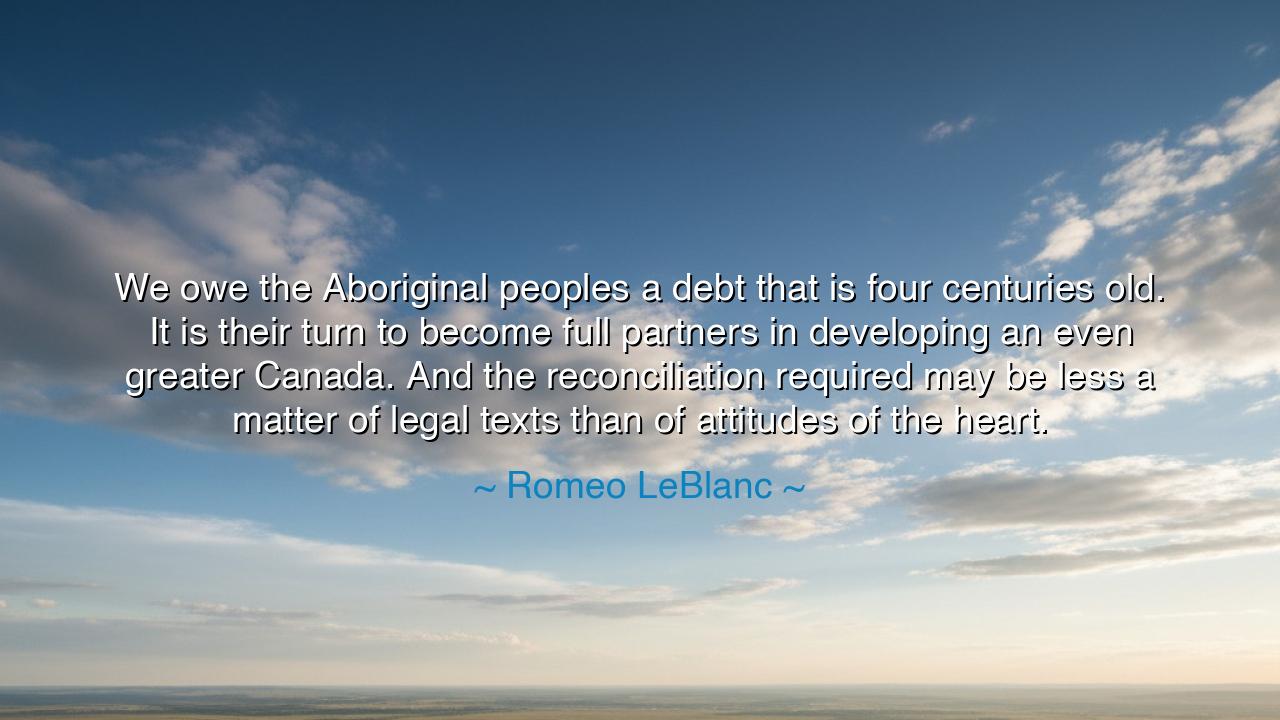
We owe the Aboriginal peoples a debt that is four centuries old.
We owe the Aboriginal peoples a debt that is four centuries old. It is their turn to become full partners in developing an even greater Canada. And the reconciliation required may be less a matter of legal texts than of attitudes of the heart.






Hear, O children of memory and builders of the future, the words of Romeo LeBlanc: “We owe the Aboriginal peoples a debt that is four centuries old. It is their turn to become full partners in developing an even greater Canada. And the reconciliation required may be less a matter of legal texts than of attitudes of the heart.” These words carry the weight of centuries, for they name a truth that nations often hide: that the land on which a country is built is not empty, but peopled, and that its first inhabitants are too often forgotten, displaced, or silenced. LeBlanc’s voice calls not merely for policy or law, but for reconciliation born of humility and compassion.
The ancients taught that debts left unpaid corrode the soul. A man who ignores his obligations to his neighbor loses not only his honor but his peace. So too with nations. For four centuries, the Aboriginal peoples of Canada bore injustice: their lands seized, their traditions scorned, their children torn from families into schools meant to erase their identity. The law may have justified these acts in cold text, but the heart of justice knew them as wrong. LeBlanc reminds us that to heal such wounds requires not only treaties and statutes, but a change of spirit, a softening of hearts hardened by indifference.
Consider the story of the Truth and Reconciliation Commission of South Africa after the fall of apartheid. Laws had been rewritten, yes, but laws alone could not cleanse the pain of centuries. It was the willingness of victims and oppressors to sit face to face, to speak truth, to weep, and to forgive, that began the healing. So too in Canada, LeBlanc’s words proclaim that reconciliation is not secured by ink on parchment alone, but by the courage to embrace one another as equals, as partners, as kin.
The origin of his words lies in his time as Governor General of Canada, where he stood as a voice for unity. At the close of the twentieth century, conversations of Indigenous rights were no longer whispers but shouts, and leaders could not ignore them. By declaring that partnership with First Nations, Inuit, and Métis peoples was not only just but necessary for a greater Canada, LeBlanc joined his voice to a turning tide—a recognition that Canada’s greatness is incomplete without its first peoples.
The meaning of this quote stretches beyond politics. It is a lesson for every human soul: that reconciliation cannot be imposed from above, but must be lived from within. Laws can compel action, but only attitudes of the heart can bring lasting peace. Without humility, treaties are hollow; without compassion, apologies are empty. Reconciliation is not the signing of a document, but the transformation of relationships between peoples.
The lesson for future generations is this: honor those who came before you, especially those whom history has wronged. Do not hide from the shadows of the past, but bring them into the light. True greatness is not built by forgetting debts, but by repaying them with justice and dignity. A nation that reconciles with its first peoples strengthens its foundations; a nation that refuses remains forever cracked.
Practical action lies before us: listen to Indigenous voices, support their leadership, protect their lands, and celebrate their cultures as living and vital, not relics of the past. Teach your children the stories of the First Peoples, not as footnotes, but as central to the land they inherit. Advocate for policies that restore rights and opportunities, but also examine your own heart—do you view Indigenous neighbors with respect and equality, or with suspicion and distance? For reconciliation begins not in Parliament alone, but in every home and every heart.
So let it be remembered: the debt is four centuries old, but the repayment begins today. Legal texts may guide the path, but it is the attitudes of the heart that will heal the wounds. Choose, therefore, the way of humility and partnership, and you will help build not only a greater Canada, but a more just and human world.






AAdministratorAdministrator
Welcome, honored guests. Please leave a comment, we will respond soon